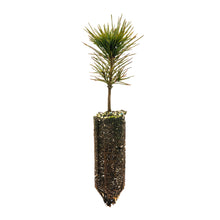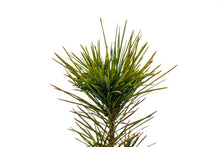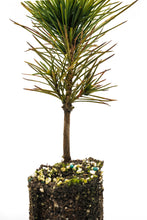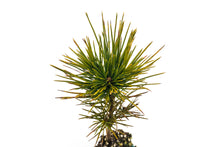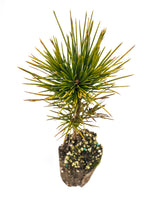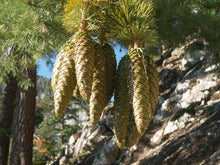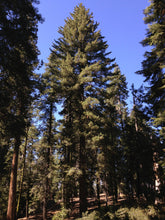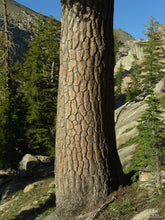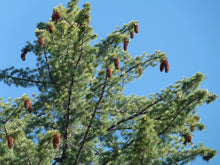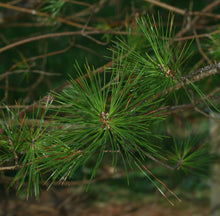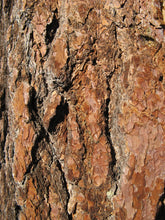
Pinus lambertiana
-
The world's largest pine tree, sometimes called "the most princely of the genus", "king of the pines", and "queen of the Sierra"
- 100% guaranteed
- Seed-grown on California's Redwood Coast
- Transplanting and care instructions included
 |
Moisture Low |
 |
Cold Hardiness -20°F |
 |
Light Full Sun / Partial Shade |
 |
Size 50 – 250' tall / 20 – 50' spread |
 |
Lifespan 500 yrs |
 |
Growth Rate Fast Growing |
 |
Drought Tolerance Low |
 |
Wind Resistance High |
About Sugar Pine
From the U.S. Forest Service:
"Sugar pines may live 400 to 500 years and are second only to giant sequoia in total volume. A record sugar pine in California measured 216 feet (66 m) tall and 122 inches (310 cm) in d.b.h. Trees up to 250 feet (76 m) tall and 10 feet (3 m) in diameter have been reported. Mature sugar pine cones are among the largest of all conifers, averaging 12 inches (30 cm) in length, and can reach 22 inches (56 cm) long. Its needles are 3 inches (7.5 cm) long and have five to a cluster. Sugar pines pyramidal crown has whorls of horizontal branches with several conspicuously longer than others. Its sap contains a sugary substance.
Sugar pine extends from the western slope of the Cascade Range in north-central Oregon to the Sierra San Pedro Mártir in Baja California. Its distribution is almost continuous through the Klamath and Siskiyou mountains and on western slopes of the Cascade Range and Sierra Nevada. Smaller and more disjunct populations are found in the Coast Range of southern Oregon and California, Transverse and Peninsula ranges of southern California, and east of the Cascade and Sierra Nevada crests. Its southern extremity is an isolated population high on a plateau in the Sierra San Pedro Mártir in Baja California, Mexico. Over 80 percent of its distribution is in California.
Sugar pine usually occurs in mixed-conifer forest stands with a wide variety of overstory associates including ponderosa and Jeffrey pine (Pinus ponderosa and P. jeffreyi), California red fir (Abies magnifica), white fir (A. concolor), noble fir (A. procera), and Douglas-fir (Pseudotsuga menziesii). In southern California, sugar pine is characteristically found in vegetation types of the woodland and timberland chaparral zones. Canyon live oak (Quercus chrysolepis) is found with sugar pine on more mesic sites, while at higher elevations sugar pine occurs with mountain whitethorn (Ceanothus cordulatus), Parry manzanita (Arctostaphylos parryana var. pinctorum), and bush chinquapin (Chrysolepsis sempervirens)."
About Jonsteen's Seedlings
All of our trees are seed-grown at our nursery on California's Redwood Coast, which is inspected monthly and licensed by the California Department of Agriculture. Trees can provide a natural barrier against high winds, temperatures, noise pollution and soil erosion, all while benefiting local air quality, wildlife and property values — a Jonsteen seedling will only grow in value and beauty!
About Jonsteen's 100% Guarantee
All of our trees are guaranteed to arrive healthy and in good condition. If your tree perishes despite your honest efforts, we will be happy to replace it with a small-sized seedling for just the cost of shipping/handling. You can learn more about our guarantee and tree replacement policy here.
Seedling Size Chart: Medium
Due to the dynamic nature of actively growing trees, as well as the tremendous variation between species’ growth rates, we rely on the cubic volume of a seedling’s root mass to determine its “size” (Small / Medium / Large / XL). Within each size there is minor variance — the dimensions provided here represent the category minimum. If exact measurements are essential, please contact us about current stock.












